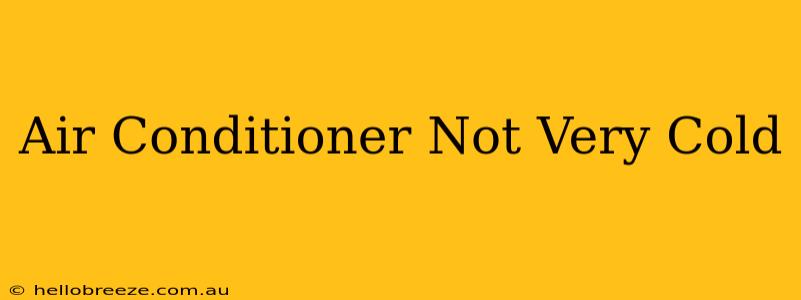Is your air conditioner not blowing cold air? A warm house in the heat of summer is incredibly uncomfortable, and a malfunctioning AC unit can be a major headache. Before you panic and call an expensive repair service, let's troubleshoot some common causes and see if you can get your AC blowing cool again. This guide will cover everything from simple fixes you can do yourself to when it's time to call in the professionals.
Common Reasons Your AC Isn't Blowing Cold Air
Several issues can lead to your AC unit not producing cold air. Let's explore some of the most frequent culprits:
1. Dirty Air Filter: The Most Common Culprit
This is the easiest and cheapest fix. A clogged air filter restricts airflow, forcing your AC unit to work harder and less efficiently. This often results in warm or lukewarm air blowing from the vents.
- Solution: Check your air filter. If it's dirty (dusty, dark, or visibly clogged), replace it with a new one. This is usually a simple process involving opening the filter compartment, sliding out the old filter, and inserting the new one. Remember to consult your AC unit's manual for specific instructions. Regular filter changes (every 1-3 months, depending on usage and filter type) are crucial for maintaining optimal AC performance and extending its lifespan.
2. Frozen Evaporator Coil: A Chilling Problem
A frozen evaporator coil is a common problem that can significantly impact cooling. This usually happens due to restricted airflow (often from a dirty filter) or low refrigerant levels. The restricted airflow prevents heat from being properly absorbed, leading to ice formation.
- Solution: Do not attempt to thaw the coil yourself with a hair dryer or other heat source. This could damage your unit. Turn off the unit and let it thaw naturally for a few hours. Once thawed, check the air filter. If it's dirty, replace it. If the problem persists, you may have a refrigerant leak and need professional help.
3. Refrigerant Leaks: A Professional Issue
Refrigerant is essential for your AC unit to cool effectively. Leaks reduce the amount of refrigerant, leading to poor cooling performance. Detecting and repairing refrigerant leaks requires specialized tools and knowledge.
- Solution: This is a job for a qualified HVAC technician. Attempting to repair a refrigerant leak yourself is dangerous and could void your warranty. Call a professional to diagnose and repair the leak safely.
4. Faulty Blower Motor: Lack of Air Circulation
The blower motor circulates cool air through your ductwork. A malfunctioning blower motor might be weak or not working at all, resulting in poor air circulation and insufficient cooling.
- Solution: This requires a professional assessment. A technician can diagnose the problem and determine whether the motor needs repair or replacement.
5. Electrical Issues: Power Problems
Problems with your AC unit's electrical components, like a faulty capacitor or compressor, can prevent it from functioning correctly.
- Solution: Call an experienced HVAC technician. Troubleshooting electrical issues in your AC unit is potentially dangerous and should only be handled by qualified professionals.
6. Thermostat Troubles: Incorrect Settings or Malfunction
Ensure your thermostat is correctly set to "cool" and that the temperature setting is appropriate for your desired comfort level. A malfunctioning thermostat can also cause cooling issues.
- Solution: Check your thermostat settings. If it's malfunctioning, you may need to replace it. Consider using a smart thermostat for easier control and energy efficiency.
When to Call an HVAC Professional
While some issues can be resolved with simple DIY troubleshooting, others require the expertise of a qualified HVAC technician. Call a professional immediately if:
- You suspect a refrigerant leak.
- Your evaporator coil is frozen and won't thaw.
- You notice unusual noises coming from your unit.
- There are visible signs of electrical problems.
- Your AC unit is consistently blowing warm air despite checking the air filter.
Remember, regular maintenance is key to preventing these issues and ensuring your AC unit functions efficiently. A well-maintained AC unit provides better cooling, lasts longer, and reduces energy consumption. Contact a professional for regular checkups and servicing to keep your home cool and comfortable throughout the summer.

